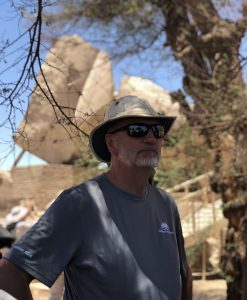 “Come, let’s go,” says the tall, sixty-something year old Dutchman as he strides off the bus, while the rest of us gather our gear and clamor off behind him. It’s only the second day of the trip and already the voice of our leader, George, has imprinted his invitation on my brain. We’d arrived in Luxor on a chartered flight, landing against the backdrop of the oversize desert sun dipping behind the cracked, craggy hills. I reach for my hat as the dry blazing heat radiates, sweat running down my sides under my dry-fit shirt the moment I’m out of reach of the bus’ cool air conditioning.
“Come, let’s go,” says the tall, sixty-something year old Dutchman as he strides off the bus, while the rest of us gather our gear and clamor off behind him. It’s only the second day of the trip and already the voice of our leader, George, has imprinted his invitation on my brain. We’d arrived in Luxor on a chartered flight, landing against the backdrop of the oversize desert sun dipping behind the cracked, craggy hills. I reach for my hat as the dry blazing heat radiates, sweat running down my sides under my dry-fit shirt the moment I’m out of reach of the bus’ cool air conditioning.
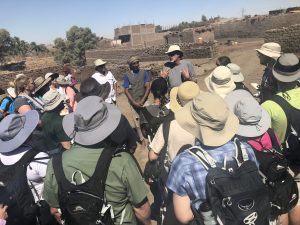 This is the kind of heat that pushes you past vanity. You’ll wear the dumb hat, the zip off shorts-pants, the backpack with the water bladder, past the point of caring about trivial things like personal style preferences. You’ll bless God as you gulp the salty electrolytes and slather your skin with sunblock. “You are investments, not tourists,” George reminds us–again. “Tourists stay on the air conditioned bus and drive up to tourist destinations. Investments…” I don’t remember what exactly he said next, but from experience that blank could be filled with: sweat, hike, put in the work, take the road less traveled, and/or generally hit their 10,000 steps by lunch.
This is the kind of heat that pushes you past vanity. You’ll wear the dumb hat, the zip off shorts-pants, the backpack with the water bladder, past the point of caring about trivial things like personal style preferences. You’ll bless God as you gulp the salty electrolytes and slather your skin with sunblock. “You are investments, not tourists,” George reminds us–again. “Tourists stay on the air conditioned bus and drive up to tourist destinations. Investments…” I don’t remember what exactly he said next, but from experience that blank could be filled with: sweat, hike, put in the work, take the road less traveled, and/or generally hit their 10,000 steps by lunch.
We never knew what to expect when the bus came to a stop, only having the vaguest of itineraries beforehand. This was intentional. Everything, we would discover over the course of two weeks, was intentional. By the end we’d follow George’s invitation to come and follow off the bus, then look around for the highest peak, the most unreasonable-looking hike, and certain assumptions about the day were made.
I loved every minute.
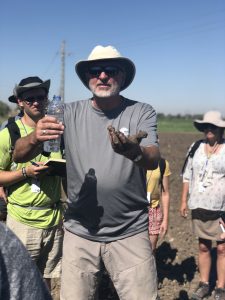 We’d already taken a boat across the Nile this particular morning, and stood in a field where George had knelt and grabbed a fist-full of dark soil into his tanned, weathered hand. We’d watched amazed as he poured water into it and the soil soaked it up so that not even a drop of wasted water slipped through his fingers. In an ancient world of drought and famine, Egypt was a miracle-land. How had I never noticed before that in the Old Testament, almost without exception, Egypt has food? The annual flooding of the Nile, leaving behind a fat layer of rich silty soil, was life. This wouldn’t have been seen by the ancient peoples in terms of lucky geography or environmental superiority, but as directly connected to their gods. Egypt had many, and by the ancient assessment they must be powerful to offer such provision.
We’d already taken a boat across the Nile this particular morning, and stood in a field where George had knelt and grabbed a fist-full of dark soil into his tanned, weathered hand. We’d watched amazed as he poured water into it and the soil soaked it up so that not even a drop of wasted water slipped through his fingers. In an ancient world of drought and famine, Egypt was a miracle-land. How had I never noticed before that in the Old Testament, almost without exception, Egypt has food? The annual flooding of the Nile, leaving behind a fat layer of rich silty soil, was life. This wouldn’t have been seen by the ancient peoples in terms of lucky geography or environmental superiority, but as directly connected to their gods. Egypt had many, and by the ancient assessment they must be powerful to offer such provision.
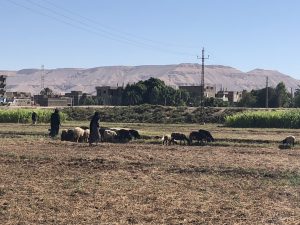
As we follow George toward the ruins of a mortuary temple constructed of stones of mind-bending mass, he makes an abrupt stop. Dramatically he points (epically, some might say) to the left from whence we’d come. The land stretches out before the temple’s ceremonial gate, lush with green fields and dark dirt. Then he turns us around and we’re confronted with a landscape opposite from our former view in every way. Dry, desert plateaus rise up, barren of vegetation, rooted in the surrounding desert.
To the left, fertility. To the right, wilderness. You can see the clear demarcation between the two. You were either in Egypt, in the fertility, or you were out. There was no in-between. As I looked at that almost-martian landscape of certain death, I was convicted that I’d been much too hard on my spiritual forebears. I imagined Moses pointing toward those hills as the way out of slavery, and everything in me instinctively rejected that trajectory.
Now I understand the grumbling for Egypt, for food, for fertility. I can see how enticing even slavery would be compared to what by all appearances is a never ending sun-scorched wasteland. The oppressive heat made me obsessive about having both a full pack of water and a bottle of electrolytes on me at all times. Could I imagine walking my children out into that unknown, trusting that something better awaited us?
The moment upended me. It was all upside-down and backward, this plan of God. Here is the sure thing, the booming economy, the fertile fields, the technology. Egypt is organized and impressive and by any measure a successful superpower. And it’s also the land of slavery and idols and death.
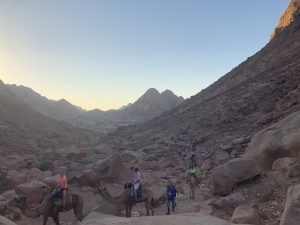 There, out in the wilderness, in the barrenness, under the scorching sun and over the dry peaks. There, where there is every appearance of death and certain destruction. There is life. There is the place where God’s people would learn to trust their God. There they would fail and circle around and try again. There they were free from their bondage, every need met by miracles. There was their training ground for the Promised Land… but I would learn more about that a couple days from now on Sinai.
There, out in the wilderness, in the barrenness, under the scorching sun and over the dry peaks. There, where there is every appearance of death and certain destruction. There is life. There is the place where God’s people would learn to trust their God. There they would fail and circle around and try again. There they were free from their bondage, every need met by miracles. There was their training ground for the Promised Land… but I would learn more about that a couple days from now on Sinai.
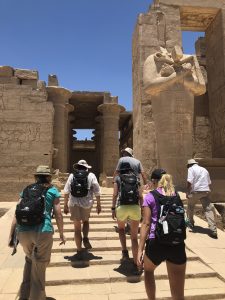 Today, I shake myself from my reflection and tap my quick thoughts into my iPhone. Picking up my pace to the beckoning of Joel, George’s back of the pack lackey, calling “faster is better than slower” and “flat and fast, people” I weave my way toward the front as we near the Ramesseum. I don’t want to miss a moment.
Today, I shake myself from my reflection and tap my quick thoughts into my iPhone. Picking up my pace to the beckoning of Joel, George’s back of the pack lackey, calling “faster is better than slower” and “flat and fast, people” I weave my way toward the front as we near the Ramesseum. I don’t want to miss a moment.
More travelouge posts to come. Well, I can promise at least one more. We’ll see what God gives for the rest. 🙂 If you’re interested in checking out a trip for yourself, I can highly recommend my experience with Under the Fig Tree Ministries. For upcoming tours check out their website: underthefigtree.org
Absolutely fascinating, Aleah. You’re insights on what it meant to leave the shores of the Nile for the desert waste illuminates the stories I’ve read over and over in new ways.